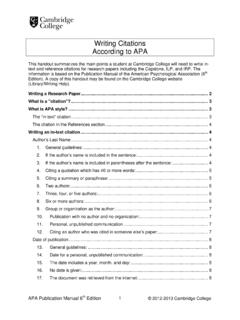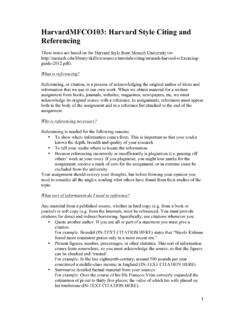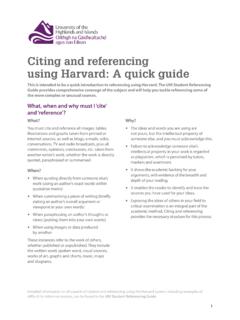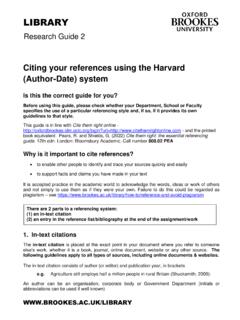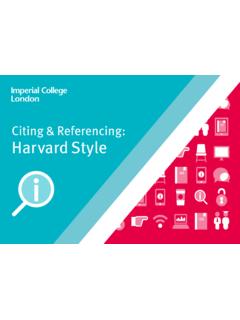Transcription of An introductory guide to citing references
1 Library & Information Services An introductory guide to citing references Please note Check your guidance provided by your lecturers or in your student handbook in case an alternative system is required Contents Page Why do we need to cite references 3. Help and further information 3 - 4. How to cite references 4. How to refer from your own work to the source you are using 5-7. How to list your references 7. Books (including chapters from books) 7-9. Journal articles 9. Electronic journal articles 10. Full-text databases - newspaper articles 11. Conferences and conference papers 11 - 12. Standards 12. Patents 12. Theses 13.
2 Unpublished material 13. Internet sites 13 - 14. Personal email 15. Discussion lists 15. citing references Why do we need to cite references ? To acknowledge other writers' words and ideas To demonstrate the range of sources used and provide some authority to your conclusions To enable readers of your work to locate and verify your sources To avoid plagiarism Plagiarism, as defined by the Aston University Regulations for the Discipline of Students (REG/02/386 ), is a form of cheating in which a student uses, without acknowledgement, the intellectual work of other people and presents it as his or her own.. Your School or Department will probably issue some detailed guidance on what is expected of you when you present your assignments.
3 You will need to refer to these or to your student handbook. It is good practice to keep detailed and accurate notes of every source of information you consult in the course of writing your assignments, this includes references to all books, journal articles (electronic and print), reports, internet sites, databases and even email correspondence. Doing so will save you a lot of time and effort in the long term and help you to keep track of what is your own work and where you have taken ideas from the work of others. Help and further information Further information about citing references is available from ASTUTE: find quality information for your studies hosted on WebCT.
4 You can get advice on how to incorporate references into your work and how to avoid plagiarism from the staff in the Learning and Skills Centre. The Centre also provides drop in workshops relating to other aspects of academic writing and study skills. You can contact the Learning and Skills Centre by email or telephone (0121) 204 3040 or visit the staff in person on the 1st floor of the Library. There are also a number of useful websites aimed at developing your understanding of referencing and plagiarism. LearnHigher The LearnHigher site at offers . a detailed guide and series of exercises. It also offers a useful FAQs section with answers to many questions relating to referencing and the option to send specific queries directly to the LearnHigher team.
5 Newcastle University This site offers a short interactive quiz aimed at developing your understanding of plagiarism. The Library has many books on referencing, study skills and academic writing. You can find many of these shelved at class number on the 3rd floor. Cite them right is a comprehensive guide to referencing and you can find copies for loan at PEA. Pears, R and Shields, G (2005). Cite them right: the essential guide to referencing and plagiarism. Newcastle upon Tyne: Pear tree books There are also reference copies of Cite them right at Enquiries on the ground floor of the Library or at Reception in the Learning and Skills Centre.
6 How to cite references There are several systems for citing references . The most commonly used systems at Aston University are the Harvard System, which is followed in this booklet, and the Numeric or Vancouver System. If you are a Psychology student, you will need to use the APA (American Psychological Association) system. Details of the APA system are provided by your department. Footnotes/Endnotes system is commonly used in law for providing statute and case references . If you need to reference legal information, please consult the OSCOLA site at Please check the guidance provided by your lecturers or in your handbook in case an alternative system is required.
7 The University has separate guidelines for the layout of references in theses. Referencing is not difficult if you follow the guidelines. The most important thing is to be consistent and follow just one system.. How to refer from your own work to the source you are using Anything you have taken from another person's work, whether directly quoted, summarised or paraphrased must be cited, that includes all information from printed and electronic sources Internet sites. For factual information like statistics, it is exceptionally important as it gives the context in which the data was collected. In-text citation: There are a number of ways to refer to a source in your assignment, whichever referencing system you use.
8 The following examples of how you might use references in your assignments come from: Levin, P.(2004). Write Great Essays! Maidenhead: Open University Press (p89). Using other people's writing as sources and acknowledging their contribution by citing '. the source supplying a reference to it is central to academic writing. citing your sources is not only a way of providing you with an important protection against being accused of plagiarism: it is also good academic practice. It shows a proper concern on your part with the quality of the evidence you have used and with substantiating your conclusion. In any worthwhile essay that you write, your reasoning will involve making use of what others before you have written.
9 Harvard system Using the Harvard system, you would use the following ways to incorporate references from other sources into your own work. 1. Summary citing sources prevents accusations of plagiarism, shows good practice and demonstrates critical reading skills (Levin, 2004). 2. Paraphrasing According to Levin (2004) there are several key reasons for citing your sources. Firstly, it prevents accusations of plagiarism. Secondly, it is good practice. And, finally, it allows you to demonstrate your ability to select and use appropriate material to support your thinking and improve the quality of your assignment. On the other hand Smith (2006) argues that.
10 3. Using quotations Good academic writing requires the use of relevant and valid sources to support your writing. citing these sources helps the author avoid plagiarism and demonstrates their understanding and interpretation of appropriate material. As Levin has argued, In any worthwhile essay that you write, your reasoning will involve making use of what others before you have written', (Levin, 2004. p89). In other words, citing sources allows . The references are then presented in alphabetical order by the author's surname. Sources by the same author are listed in order of publication date. Levin, P.(2004). Write Great Essays!

